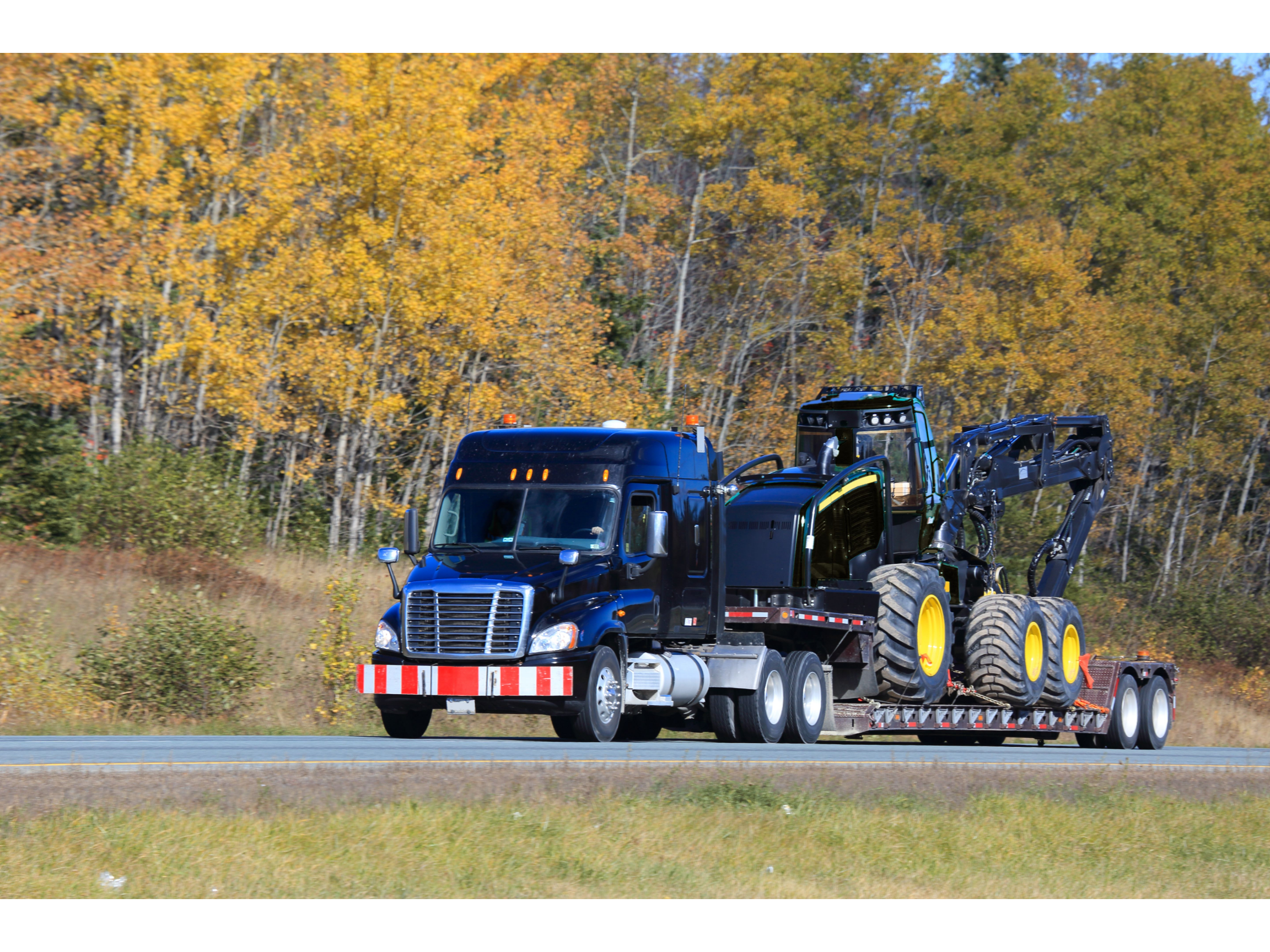When you need to transport something that is oversized, be it a piece of heavy equipment, a large container, a small building or a storage tank, you need to have confidence in your driver. Oversized shipping is complex and provides challenges for loading, transport, and unloading, no matter where your destination is. The Tri-State area of Tennessee, Mississippi, and Arkansas is no exception. With the unique terrain and distinct rules and regulations, you and your driver need to have a clear understanding of the process. In this blog, we’ll provide you with everything you need to know to ensure a successful heavy transport operation.
What Is Oversized Shipping?
Just as there are rules for which side of the road to drive on, how fast you can drive, and which lane to stay in, there are rules for what size of vehicle can be on the road. There are limitations to how wide, tall, long, and heavy a vehicle can be. When a truck and the load it is pulling exceed those limitations, it is considered to be oversized. It can be over the limit in all of the categories, a combination, or just one, and it is still considered oversized.
When a truck and its haul measure in at oversized, there are special considerations to be made for legal reasons and safety reasons. And each restriction comes with limitations. While laws and rules can change, which is why it’s important to always check with your state department of transportation, this guide is your basic instructions for oversized shipping in the Tri-State area.
Understanding the Regulations
Before you look for a heavy haul driver, it’s essential to understand the regulations in your area and on the route your shipment will travel. The first thing to know is what the measurements of your shipment are and what the limitations are for the tri-state area.
Oversized Shipments in Tennessee
The weight and size restrictions of the state of Tennessee are as follows:
Weight
- 80,000 pounds for Gross Weight
- 20,000 pounds per Single Axle
- 34,000 pounds per Tandem Axle
Size
- 8’6″ in Width
- 13’6″ in Height
- 45′ in Length for a Straight Truck
- 65′ in Length for a Straight Truck with a Trailer
- 50′ in Length for a Truck Tractor & Semi-Trailer from kingpin to rear of the trailer
Oversized Shipments in Mississippi
The weight and size restrictions of the state of Mississippi are as follows:
Weight
- 80,000 pounds for Gross Weight
- 20,000 pounds per Single Axle
- 34,000 pounds per Tandem Axle
Size
- 8’6″ in Width
- 13’6″ in Height
- 53′ in Length for a trailer
- 99′ in Overall length
Oversized Shipments in Arkansas
The weight and size restrictions of the state of Arkansas are as follows:
Weight
- 80,000 pounds for Gross Weight
- 20,000 pounds per Single Axle
- 34,000 pounds per Tandem Axle
Size
- 8’6″ in Width
- 13’6″ in Height
- 53′ 6″ in Length
Compliance With Regulations
Complying with the rules and regulations in each state is essential. If pulled over for an inspection, drivers must present their permits; otherwise face hefty fines. It’s never worth the safety risk to cut corners or skip obtaining a permit. To avoid hefty fines or more serious consequences, you’ll want to ensure that your shipment complies with all relevant regulations and guidelines.
Choosing the Right Equipment
The right equipment is essential to hauling oversized equipment. The load needs to fit on the trailer, which means there are several factors to consider when selecting the right trailer:
- Is the trailer low enough to accommodate the height?
- Is the trailer long enough to support the length?
- Is the trailer wide enough to support the width?
- Are there enough axles on the trailer to support the weight?
The right equipment can make all the difference in a heavy transport job. The types of trailers you can select from for an oversize load include:
- Flatbed trailers
- Lowboy trailers
- Step-deck trailers
- Removable gooseneck trailers (RGNs)
- Boosters and jeeps
Axle Configurations
Heavy haul shipments often require specific axle configurations to distribute the weight properly and reduce stress on roadways and bridges. Different states may have varying requirements for axle spacings and configurations.
Permit Requirements
Oversize loads require special permits before they can be transported. Not only does an oversized load permit give the driver permission to transport the haul, but it also brings restrictions on which routes the driver can travel, when they can be on the road with the load, and when they are restricted from travel.
These permits can be acquired from each state’s department of transportation.
- Tennessee Department of Transportation
- Arkansas Department of Transportation
- Mississippi Department of Transporation
Planning the Route
Based on restrictions for travel, drivers of oversized loads must carefully plan their routes. It’s best practice to plan alternate routes in the event of obstacles such as construction, weather, or detours. They’ll also select the route that their load can fit on, meaning if the shipment is over in height, they’ll avoid bridges and overpasses that don’t have clearance. With oversized transport, choosing the quickest route is not always possible.
Having more than one route mapped out gives drivers options and reduces stress on the road when obstacles arise. Most drivers use modern GPS systems designed for the trucking industry so that if a detour is required, they have the means to find a new route to accommodate them within minutes just by using their device.
Escort Vehicles
Each state’s rules vary, especially when it comes to using escort vehicles with an oversize load. It may depend on the time of day you’re travelling, the specific road you’re on, or which dimension is oversized.
Escort vehicles are meant for safety. They accompany the convoy to help ensure safe navigation and keep communication with the drivers and authorities as needed. Escort vehicles can travel behind oversized loads to alert traffic in the same direction that a load ahead is extra long or extra wide. They can also travel in front to alert oncoming traffic that there is a wide load ahead. They also scout for unexpected height issues for loads that are overly tall. And sometimes, superloads have multiple escort vehicles to alert traffic in all directions.
In special circumstances, if a super load needs to travel through a busy city road, law enforcement will be involved to help direct traffic and ensure the truck gets to the destination safely.
Safety Precautions
Safety should always be a top priority in heavy transport. From loading the machine properly to securing the load for the trip to following the rules of the road, safety needs to be the main focus. With oversized loads, the rules will often state what type of signage is required on the front and back of the trailer (wide, oversized, or ‘D’ load), along with where to place red or orange flags or use flashing lights.
Loading heavy machinery, equipment, or supplies onto the trailer requires careful planning, such as choosing an open, flat area for the truck and trailer to maneuver. If the machine can drive onto the trailer by a ramp (the roll-on/roll-off method), it’s important to have a confident driver who knows how to drive steadily and park in the right location on the trailer. Other loads that cannot drive onto the trailer will require some type of assistance for loading, such as a forklift or crane.
Communication
Communication with relevant authorities is important for safely transporting an oversized load, as mentioned above. It’s also important to keep communication between the driver and the customer. While this communication is important leading up to the transport day, it’s also essential during transit. The driver needs to be able to reach the customer if anything unexpected happens or delays are inevitable. They also need to be able to check in and confirm everything is going smoothly and when they safely reach the destination. Just because your shipment is on the truck and in transit doesn’t mean your work as the customer is done.
Finding the Right Transport Company
If you’re not familiar with the Tri-State area, it’s best to work with a transport company that has experience operating in the region and has the skill and knowledge to haul an oversized load.
Keep in mind that working with experienced logistics and transportation professionals who specialize in heavy-haul shipping can also be extremely helpful. They can navigate the challenges of regulations and help ensure a smooth transportation process.
A reliable transport company will have reviews, ratings, and testimonials on their website, proving their experience in successfully hauling heavy loads. They’ll also prioritize safety and customer service so you know you’ll never be kept in the dark about your shipment. And, a company that offers fair rates and isn’t set on charging extra, hidden fees is a company you’ll want to work with.
Getting a Quote for North American Heavy Hauling
Getting your quote or estimate should be hassle-free with whichever company you choose. Using Trusted Dispatch, you can get your free quote instantly by using our free shipping quote calculator. Just enter the dimensions and weight of your shipment, along with the pick-up location and drop-off destination, and you’ll instantly get a fair, competitive quote for heavy haul trucking.
Don’t know the measurement of your heavy equipment? Use our powerful Specs Tool to find the specs of the based model closest to yours. With over 60,000 models saved and preloaded, you’re likely to find exactly what you’re looking for.
Permits, escort vehicles and costs associated with long hauls won’t be applied to the base quote, but an experienced driver will provide you with an all-in offer so you don’t have to stress over arranging those details. Within our load board, we have hundreds of professional heavy haul truckers across North America with routes that will line up with your needs.
Heavy Haul Transport in Tennessee, Arkansas, and Mississippi
Since regulations and guidelines can change over time, we recommend reaching out to the transportation departments of Tennessee, Mississippi, and Arkansas for the most current and accurate information regarding heavy haul shipping in their respective states. They can provide you with up-to-date information on permits, routes, regulations, and any other requirements you need to be aware of.
Heavy transport in the Tri-State area can be challenging, but with the right knowledge and preparation, you can ensure a successful operation. By understanding the regulations, choosing the right equipment, planning the route, taking safety precautions, and finding the right transport company, you and your driver will be ready to deliver your oversized load to its destination.





